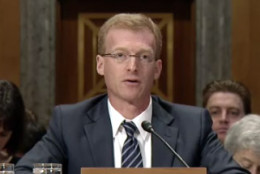Congress
-
A new commission, proposed by David Walker, former U.S. comptroller general, would recommend ways to streamline government by removing duplication and extraneous spending from government agencies. Federal-employee unions criticized the proposal and House Oversight and Government Reform Committee lawmakers expressed skepticism that such a proposal could gain congressional approval.
June 18, 2013 -
The first major IT reform bill in a decade has cleared the first of three hurdles to become law. The bill would empower CIOs by reducing the number of people with that title to one per agency, and give that person authority over the IT budget and personnel decisions.
June 14, 2013 -
Amid nearly unanimous congressional opposition, the Defense Department says it needs to stop operating military facilities it no longer wants or needs.
June 14, 2013 -
NIST, charged with developing the nation's first-ever cybersecurity baseline for critical infrastructure, says its job is to provide technical assistance to companies, but industry itself must lead the way. Gen. Keith Alexander said NSA will review the use of contractors.
June 13, 2013 -
President Barack Obama's pick to head the Office of Information and Regulatory Affairs (OIRA) pledged to clear up delays in the regulatory process if confirmed by the Senate. Appearing before the Senate Homeland Security and Governmental Affairs Committee Wednesday, Howard Shelanski said improving the timeliness of OIRA's work -- which has come in for criticism from Republican lawmakers and transparency groups, alike -- is among his top priorities.
June 12, 2013 -
The Defense Department is examining all of its contracts as part of the reductions necessary under automatic budget cuts. Reductions to contractors, not civilians, will make up "the majority" of the cost savings.
June 12, 2013 -
All veterans who have waited two years or more for a decision will have their cases decided by next month, the Department of Veterans Affairs told Congress. Half of the Veterans Benefits Administration's oldest cases already have been removed from the backlog.
May 24, 2013 -
The Defense Department reduces the number of furlough days from 14 to 11. Defense Secretary Chuck Hagel said it's possible the number could drop further, but he offered no promises.
May 15, 2013 -
Funding reductions in 2013 appropriations act are sufficient to protect military construction accounts from further sequestration cuts, but funds used for upkeep on existing buildings are severely impacted.
May 13, 2013 -
Pentagon says it will use its limited budget flexibility to compensate for unexpected war costs, not to blunt sequestration. Services continue to warn Congress about how budget cuts are impacting readiness.
May 09, 2013 -
The top lawmakers on the Senate Armed Services Committee have called on the Defense Department to detail how it will cut billions more from its budget if sequestration continues into next year. In a letter dated May 2, Sens. Carl Levin (D-Mich.) and James Inhofe (R-Okla.), the chairman and ranking member, respectively, of the committee, asked Defense Secretary Chuck Hagel to provide a "package of reductions" to the department's proposed 2014 budget.
May 07, 2013 -
The Pentagon insists it is paying to maintain much more military base infrastructure than it needs, and the problem will only get worse as the Defense Department shrinks due to budget reductions. Congress, however, remains unsympathetic.
May 06, 2013 -
Currently deployed units and those behind them are fully trained and equipped, the services say. But those next in line "aren't doing much." The fiscal 2013 budget also may be too little, too late in some ship repair and maintenance efforts.
May 02, 2013 -
When politicians created the sequestration monster, it may have seemed like a good idea at the time. But now that it's here, nobody wants to take credit for it, Senior Correspondent Mike Causey says. And politicians who insisted that the cuts be across-the-board are now demanding agencies exempt certain programs and people from furloughs.
May 02, 2013 -
Rep. Dave Camp (R-Mich.) introduced legislation to require federal employees, the president, vice president and members of Congress to use insurance under the Affordable Care Act instead of the current federal program.
May 01, 2013



